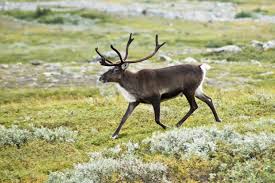reindeer
英 [ˈreɪn.dɪər]
美 [ˈreɪn.dɪr]
- n. [脊椎][畜牧] 驯鹿
星级词汇:

中文词源
reindeer 驯鹿
来自古诺斯语 hreindyri,来自 dyr,动物,鹿,词源同 deer,鹿,hreinn,驯鹿,来自 PIE*ker,角, 词源同 horn.该词 rein-本身已经表示鹿,与 rein(缰绳)没有词源联系,巧合的是,这种鹿 确实大量的被人工驯养并用于拉雪橇。
英语词源
- reindeer (n.)
- c. 1400, from a Scandinavian source such as Old Norse hreindyri "reindeer," from dyr "animal" (see deer) + hreinn, by itself the usual name for the animal, from Proto-Germanic *khrinda- (cognates: Old English hran "reindeer;" German Renn "reindeer," which was altered by folk etymology influence of rennen "to run;" Swedish ren-ko "female reindeer," with ko "cow" (n.)).
Probably from PIE *krei-, from base *ker- (1) "horn, head," with derivatives referring to horned animals (both male and female reindeer have horns; those of the male are remarkable), and thus perhaps cognate with Greek krios "ram" (see kerato-). Older sources connect it to words in Lapp or Finnish. French renne, Spanish reno, Italian renna ultimately are from Germanic.
权威例句
- 1. Reindeer receded northward and eastward, and bison and horse followed.
- 驯鹿向北方和东方撤退, 野牛和马也随之而去.
- 2. The life of the Reindeer men was a frontier life.
- 驯鹿时代人的生活是一种边区生活.
- 3. The herd of reindeer was being trailed by a pack of wolves.
- 那群驯鹿被一只狼群寻踪追赶上来.
- 4. I thought the magical reindeer made The sleighs fly.
- 不是魔法驯鹿让雪橇扶摇直上的吗?
- 5. Their traditional livelihood revolves around reindeer, which number about 200,000 in Finland.
- 他们传统的生计是靠芬兰国内的大约20万只驯鹿.
